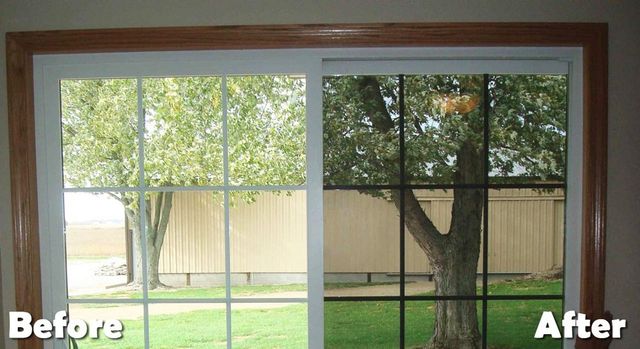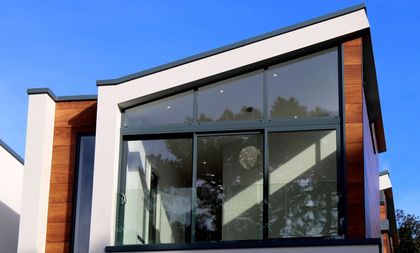Just How Residential Window Tint Can Decrease Power Costs
Exactly How Residential Home Window Tinting Boosts Your Home's Energy Efficiency
Residential home window tinting offers a compelling remedy for house owners seeking to improve power effectiveness within their living rooms. By using specialized films to windows, it properly minimizes warm transfer, consequently supporting indoor temperatures and lessening the need for excessive home heating or air conditioning. This not just curtails power intake however likewise gives a much more comfortable environment by reducing glare. However, comprehending the nuances of exactly how tinting jobs and picking the suitable kind for your home can be critical. Strangely enough, what variables should one take into consideration before making this investment?
Understanding Home Window Tinting
Comprehending window tinting is crucial for property owners seeking to enhance both convenience and energy efficiency in their home. Residential Window Tint. Window tinting includes the application of a slim film to the inside or outside surface of glass home windows. This movie can dramatically modulate the amount of sunshine and heat that goes into a home, hence affecting interior climate problems
There are numerous sorts of window tinting films readily available, each with unique residential or commercial properties. For instance, colored films take in solar power, while reflective movies deflect it away from the glass surface area. Ceramic movies provide an equilibrium of presence and warmth being rejected, making them a prominent option amongst property owners. The efficiency of window tinting is typically measured by its Visible Light Transmission (VLT) percentage, which shows just how much light can go through the film.
Benefits of Power Performance
Home window tinting not only enhances appearances however additionally plays a significant duty in boosting power effectiveness within domestic spaces. By minimizing warmth transfer via home windows, colored films develop a much more stable interior climate, which can bring about substantial reductions in energy consumption for heating and air conditioning. This energy effectiveness translates right into reduced utility expenses, providing homeowners with substantial long-lasting cost savings.

Additionally, window tinting boosts the comfort of living spaces. By minimizing glow and blocking damaging UV rays, tinted home windows develop a more enjoyable environment, which can bring about enhanced health for residents. The protection versus UV rays likewise aids preserve furnishings and flooring from fading, adding to the longevity of house items.
Exactly How Tinting Functions
Tinting movies operate through a combination of advanced products and innovations made to regulate the quantity of solar energy going into a home. Primarily composed of polyester, these films frequently incorporate ceramic or metal bits that soak up and reflect warm. This twin ability permits them to significantly decrease the penetration of ultraviolet (UV) rays and infrared radiation while permitting noticeable light to travel through.
The effectiveness of window tinting is gauged by its solar heat gain coefficient (SHGC), which suggests just how much solar power is transferred through the home window. Reduced SHGC values are preferable as they denote higher warm denial. Furthermore, window tints can include a range of tones, enabling house owners to personalize their visual choices while improving power efficiency.
In addition, these films work as an obstacle, preventing warm loss throughout cooler months by reflecting interior warmth back into the space. This thermal insulation result enhances the air conditioning advantages acquired during warmer months, adding to a well balanced interior climate year-round. By taking care of solar energy properly, domestic window tinting not just enhances convenience but additionally plays a crucial role in lowering energy consumption and decreasing utility bills.
Picking the Right Color

There are various sorts of window films readily available, consisting of dyed, metalized, and ceramic. Dyed films are cost-effective but may have limited durability. Metalized films supply much better warm denial however can conflict with digital signals. Ceramic movies give excellent warmth control without endangering visibility and are highly sturdy, making them a popular option.
Visible light transmission (VLT) is an additional important variable, as it indicates the amount of all-natural light that can pass through the colored glass. Home owners ought to pick a tint with a VLT that enhances their illumination preferences while still giving sufficient glow decrease.
Additionally, examining the solar heat gain coefficient (SHGC) can aid determine exactly how well a color can obstruct heat from sunshine. A reduced SHGC shows better heat control, ultimately enhancing power performance.
Setup and Upkeep Tips
Appropriate installment and maintenance are essential components in taking full advantage of the advantages of domestic home window tinting. To achieve ideal outcomes, it is a good idea to employ a qualified specialist for installment. This guarantees that the tint is used correctly, preventing air bubbles, wrinkles, or imbalance that can endanger efficiency. Professionals additionally use specialized tools and methods, which can boost the sturdiness and effectiveness of the color.
Following installation, upkeep is essential to prolong the life of the home window movie. It is suggested to wait at least 30 days prior to cleansing the colored windows to enable the glue to treat totally.
Addressing these problems promptly can protect against more damage and preserve energy efficiency. By sticking to these installation and upkeep ideas, homeowners can guarantee their home window tinting continues to give considerable power savings and convenience for years to come.
Final Thought
To conclude, property home window tinting offers as a reliable remedy for boosting power performance within homes. By reducing warm transfer and obstructing harmful UV rays, window movies add to decrease energy usage and improved interior comfort. The choice of appropriate tinting materials, in addition to appropriate setup and upkeep, further explanation takes full advantage of these benefits. Ultimately, window tinting represents a lasting financial investment that not only reduces utility costs yet likewise promotes a comfortable living setting throughout the year.
Window tinting entails the application of a thin movie to the interior or outside surface of glass windows. By decreasing warmth transfer with home windows, colored films create an extra stable indoor environment, which can lead to considerable decreases in power consumption for home heating and air conditioning.The effectiveness of window tinting is gauged by its solar warm gain coefficient (SHGC), which shows how much solar power is sent via the window. By taking care of solar anchor energy properly, domestic window tinting not just boosts comfort but also plays a vital function in decreasing power intake and decreasing energy bills.
By minimizing warmth transfer and obstructing unsafe UV rays, window films add to reduce energy consumption and improved indoor comfort.